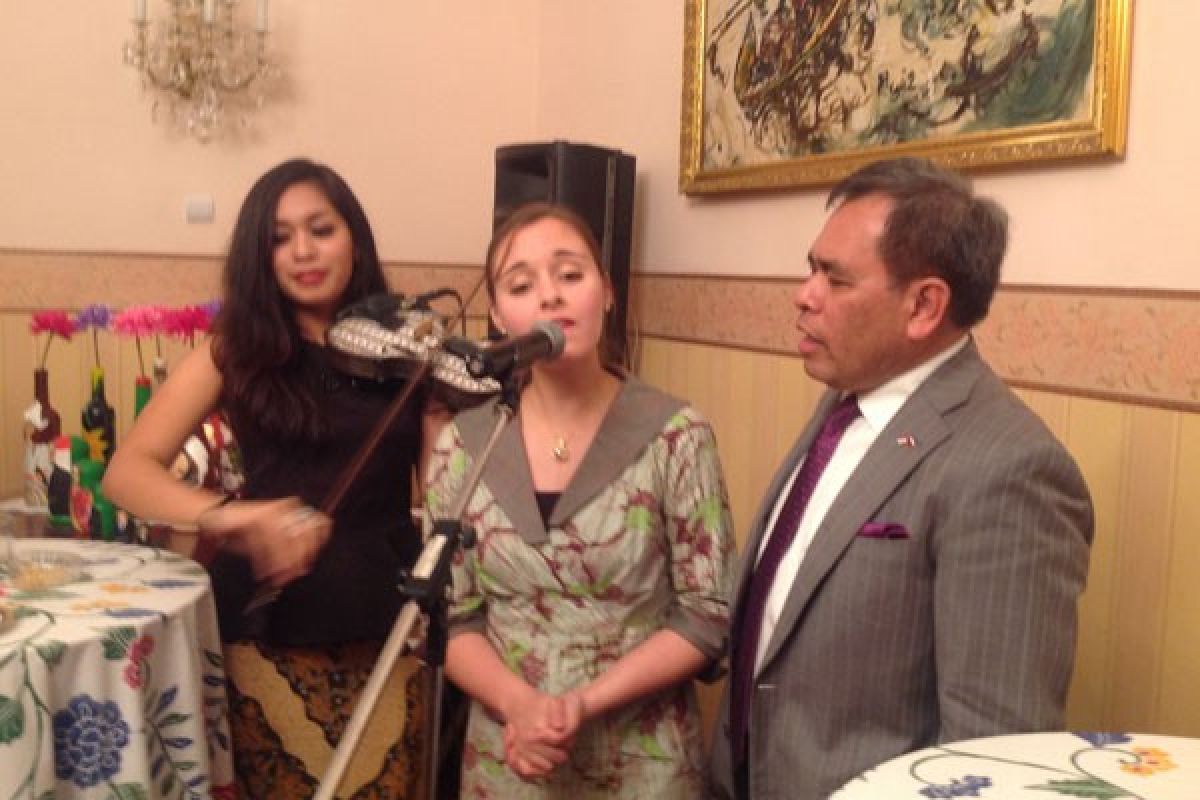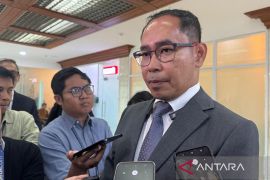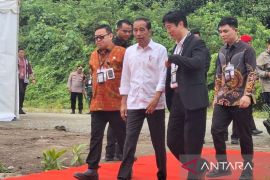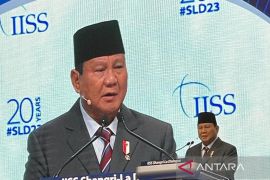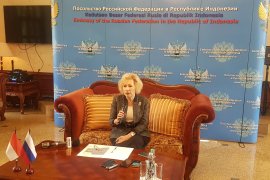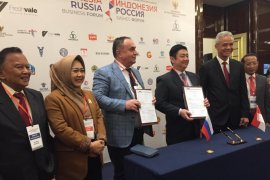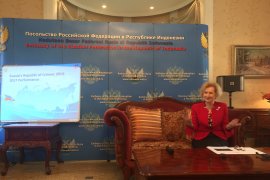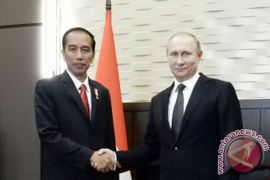It was only recently that an Indonesian delegation led by Director General of Information and Public Communications of the Ministry of Communications and Information Technology (MCIT), Freddy H Tulung visited Russia and Belarus to promote second track diplomacy involving journalists, artists and academicians.According to Freddy Tulung, the visit by the Indonesian delegation is aimed at strengthening the relations between Indonesia and Belarus, and Indonesia and Russia through public diplomacy.
"This is especially based on the second-track diplomacy where non-state actors are taken advantage of to contribute in the effort to enhance cooperation and mutual understanding.
As to media, the role they play in the second-track diplomacy is actually no more than what they have done so far like gathering news from different sources including interviews with such high-ranking diplomats as ambassadors during which they do not only do their journalistic works but also seek insights and discuss ideas on possible cooperation to promote the two countries¿ interests.
Before leaving for Belarus and Russia, Antara news agency which joined the Indonesian delegation to the two countries had for instance interviewed Belarusian Ambassador to Indonesia Vladimir Lopate Zagorsky and Russian Ambassador to Indonesia Mikhail Galuzin for seeking information on possibilities of cooperation between news agencies of the countries besides its journalistic works.
As part of its role in the second track diplomacy, the Indonesian national news agency was tasked to produce a newsletter featuring topics on the country's bilateral relations with Belarus and Russia on different aspects of life and prospects of future cooperation in various fields including economy, politics and socio-culture.
During the visit to Belarus and Russia, the news agency's journalist along with other members of the delegation including Indonesian senior journalists, artists and academicians was engaged in a number of such functions as a get-together, dialogues and seminars in which he shared experience, exchanged ideas, sought and gave information.
In addition, Antara was also tasked to lead a group to visit its Russian counterpart Itar-Tass news agency and Belarusian Belta news agency. With Itar-Tass, Antara agreed to continue the cooperation as stated in the memorandum of understanding (MoU) with an additional article on a joint photo exhibition.
With Belta news agency, Antara meanwhile agreed to establish cooperation on exchanges of news and official visits as well as organizing a joint photo exhibition with an intention to disseminate information about current issues both at national and global levels.
In the meantime, other journalists joining the delegation from Kompas daily made intensive coverage of the mission in Russia and Belarus, while those from Metro TV, Media Indonesia newspaper and Tempo magazine were involved in seminars as speakers who told the audience about the history of mass media development and the freedom of the press in Indonesia.
News Director of Metro TV Suryo Pratomo spoke of the press as a pillar of democracy.
Suryo Pratomo said journalists and media people in Indonesia can feel how precious the freedom of expression is.
In 32 years of new order era (1966-1998), media had a lot of limitation as the government at that time controlled the media, he said, adding that the government could close the media if the former thought the latter criticized the government.
However, he said following the reform era since 1998, the media in Indonesia have enjoyed the most freedom in the world as they should not have license from the government to have publication, while the government could not control the media because there is a law that protects the media.
Islam in Indonesia
Meanwhile, President of the Indonesian Conference on Religion and Peace, Prof. Dr. Musdah Mulia spoke of historical background of Islam in Indonesia.
According to Musdah, Muslims come from diverse nationalities, ethnic and tribal groups, and cultures, speak many languages and practice distinct customs.
She pointed out that the majority of the world's Muslims live in Asia, particularly in Indonesia, not the Arab world. Only about one in five of the world's Muslims are Arabs. The largest Muslim communities are in Indonesia.
Islam came to Indonesia in the 13th century and was spread by traders and preachers who disseminated Islamic teachings throughout the Indonesian archipelago, she said, adding that the key to the success of Islamic propagation in the archipelago was not conquest. That is a fact. Rather, it was the ability of Islamic preachers to adopt a cultural approach to the local traditions, beliefs and wisdom.
Instead of forcing sharia (Islamic law) on the community, the preachers of Islam who were well known as nine saints, especially in Java develop a cultural Islamic approach by accommodating certain aspects of local traditions, beliefs and wisdom," she said.
"As a result, there was a process of indigenization of Islam in Indonesia. Throughout the history of Indonesia, Muslims were able to develop mutual respect, understanding and tolerance of others. It is obvious that the development of Islam in Indonesia is very different compared to that of Islam in the Middle East," Musdah added.
Now, Indonesia is the largest Muslim country in the world. It is home to almost two hundred million Muslims, which is approximately 87 % of the total population of Indonesia. Despite the fact that the majority of Indonesians are Muslims, Indonesia is not an Islamic state. Indonesia's state ideology is not Islam, but is based on Pancasila (Five principles, namely Belief in God; Just and civilized humanism; Unity of Indonesia; democracy; and social justice).
Batik
The way to make the second track diplomacy a success is also to involve artists as they have special skills that attract people. Among artists who were involved in the Indonesian delegation to Russia and Belarus is noted female violinist Mia Ismi Halida who is also a Miss Batik of Indonesia.
Besides attracting people with her skills in playing a violin, Mia is also able to promote Batik which is the traditional cloth which has been recognized as one of the world heritages originating from Indonesia by the United Nations Educational, Scientific, and Cultural Organization (UNESCO).
Batik is different from those of other countries as Indonesian Batik which is rich in beautiful designs has philosophy. Let alone Batik from Java that has various kinds of motifs like Batik Kawung, Batik Truntum, Batik Parang and Batik Sido Mukti. Each of them has a special meaning, she said, adding that each of those kinds of Batik has a special meaning.
Not only did Mia tell Russians taking part in a cultural night at the Indonesian embassy in Russia about Batik, she also sang such Indonesian national songs as Rayuan Pulau Kelapa, Halo-halo Bandung, Bengawan Solo and Rasa Sayang Sayange that attracted senior citizens who once lived in Indonesia tens of years ago.
One of Russian students, Maria clad in Batik also joined Mia singing some Indonesian national songs. Maria who also speaks Indonesian said that she likes the country because of its people who are hospitable, its language, its culture and its nature.
Another Russian student, Irina Antonova who has been to some cities in Indonesia including Jakarta and West Sumatra said she also likes the Indonesian language, culture and arts like Javanese shadow puppet which has a special philosophy.
Freddy Tulung pointed out that the mission of the second track diplomacy in Russia and Belarus is effective and among the indications of the success is that Russia was happy as the Indonesian delegation including the media came when that country was blasphemed by western media.
Meanwhile, Belarus hoped Indonesia would open its embassy in its capital city of Minsk in the effort to enhance the bilateral relations in many sectors including politics, economy and socio-culture.
Reporter: Bambang Purwanto
Editor: Aditia Maruli Radja
Copyright © ANTARA 2014
